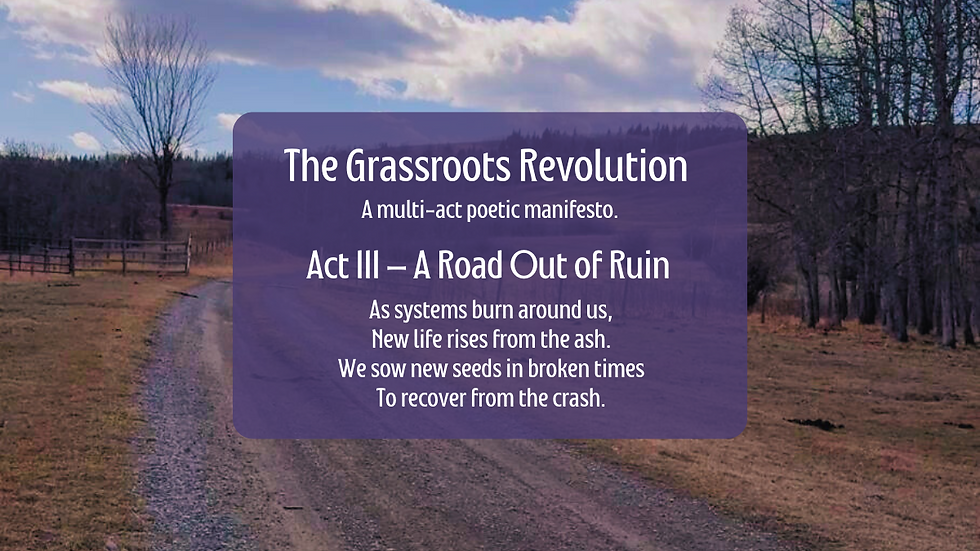The Duality of Wealth and Poverty: Bridging the Deep Divide
- Bridget Lacey
- Jan 14, 2018
- 3 min read
Updated: Jan 18, 2025
The divide between wealth and poverty has never been more apparent. On one side, there are individuals—often in positions of power—living lives of outrageous wealth, to the point where it becomes wasteful. On the other side, millions struggle in extreme poverty, unable to access even basic necessities like shelter, clean water, or healthcare. This growing divide deeply affects billions across the globe, creating a world of inequality that is unsustainable and unjust.
The Illusion of Equal Opportunity
Capitalism often champions the idea that anyone can succeed if they work hard enough—that we all have equal opportunities. Yet, when we look at the realities of life in impoverished areas—whether slums or economically depressed regions—it’s clear that this is far from true. Poverty, especially extreme poverty, is not simply a result of poor decisions but is often the product of circumstance, social segregation, and a lack of opportunities. It's a trap that’s nearly impossible to escape under the current economic systems.
Poverty in the Developed World
Poverty is not confined to developing countries. In North America, many individuals work for “poverty wages,” including those on minimum wage jobs. Despite their contributions to society, they cannot afford basic needs or access opportunities for upward mobility. Social assistance often falls short for families, especially those dealing with disabilities or mental health challenges. Many families live paycheck to paycheck, vulnerable to financial setbacks such as job loss or illness, which can quickly push them into deeper poverty. This reality affects half of all Canadians.
The Debt Trap and Systemic Inequality
High consumer debt and predatory lending practices only exacerbate the economic instability faced by so many. Meanwhile, corporate loopholes and inequitable taxation systems allow the wealthy to protect their assets, widening the wealth gap. The powerful few manipulate policies to safeguard their interests, entrenching the divide between the rich and the poor. These policies not only perpetuate inequality but also harm the environment and erode social structures.
The Capitalist Illusion of Wealth
At the heart of the divide is the false belief that wealth, as currently understood, equates to true value. The elite have engineered economic systems that artificially inflate their own assets while devaluing the work and contributions of others. This monopoly on resources—natural, human, and financial—has allowed them to dominate economies and suppress the voices of those trapped in poverty. Some of the tools they use to maintain this system include:
Suppressing the value of commodities and natural resources
Creating artificial corporate valuations through stock markets
Issuing unsustainable global debt, now exceeding $233 trillion
Devaluing emerging economies through currency manipulation
Exploiting developing nations under the guise of free trade
Imposing austerity measures that sacrifice social services to service debt
These tactics deepen economic inequality and contribute to the destruction of the environment.
A Call for Economic Reorganization
To address these profound imbalances, a grassroots movement for the reorganization of global economic policies is essential. Here are key actions we can take:
1. Taxation Reform
Close corporate tax loopholes, raise estate and corporate taxes, and reduce the tax burden on low- and middle-income individuals and small businesses. This will help strengthen local economies.
2. Global Currency
Create a global currency benchmarked to living wages, to level the economic playing field between developed and developing nations.
3. Corporate Accountability
Ensure corporations adhere to ethical and environmental standards both domestically and internationally, preventing exploitation of vulnerable nations.
4. Debt Control
Limit new debt creation, eliminate predatory lending practices, and reduce interest rates on credit cards, loans, and mortgages to prevent economic enslavement.
Reclaiming Economic Balance
The extreme wealth and poverty imbalances we see today are not the result of natural forces—they are the product of human systems designed to serve the few at the expense of the many. To reclaim balance, we must challenge the illusion of wealth created by the capitalist elite. The grassroots movement must rise up, demanding economic reform that prioritizes human dignity, environmental stewardship, and the equitable distribution of resources.
Creating a more just, inclusive world is possible—but only if we actively dismantle the systems of oppression and inequality that have been built over time. Change begins with awareness and gains momentum through collective action.





Comments